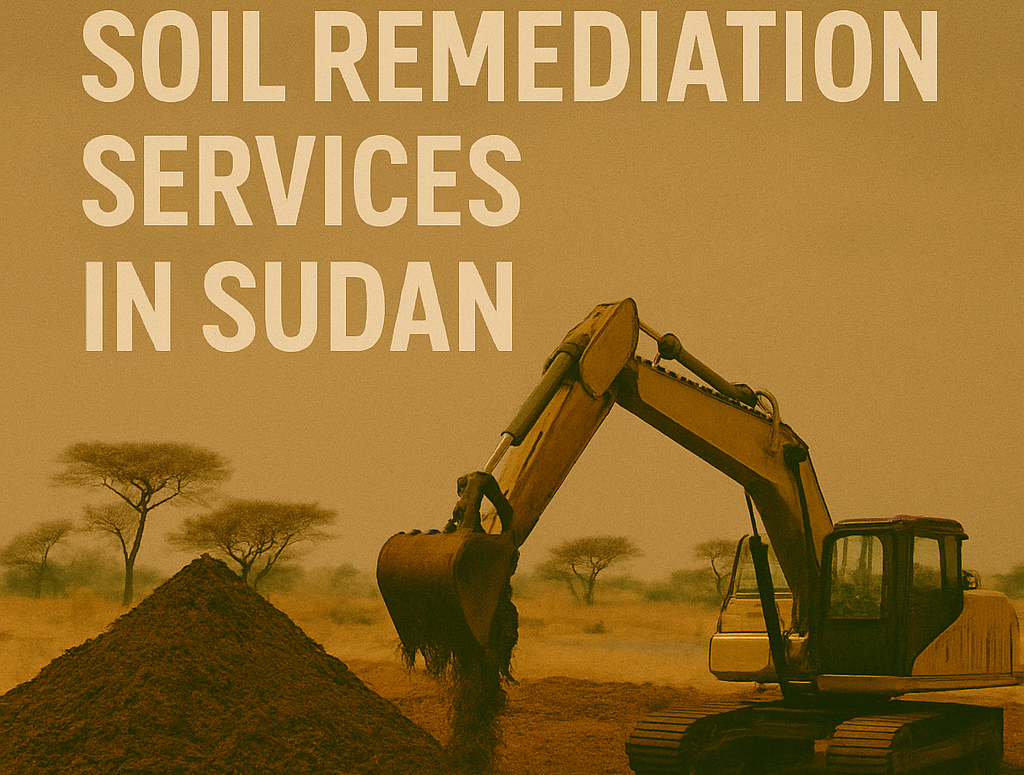Restoring Land and Safeguarding Water
Introduction
Sudan, from the fertile stretches of the Nile Valley to its vast arid landscapes, is confronting a mounting environmental crisis—soil and groundwater contamination. While agriculture remains the backbone of the nation’s economy, decades of intensive farming, oil exploration, mining, and rapid urban growth have placed immense pressure on already fragile soils and limited water resources. Pollution from oil spills, industrial effluents, and unsustainable agricultural practices is now undermining food security, threatening rural livelihoods, and putting public health at risk.
At The Ground Water Company (GWC), we deliver specialized soil remediation services across Sudan. Our goal is clear: to rehabilitate degraded land, safeguard aquifers, and assist industries, municipalities, and communities in meeting environmental standards—while building a foundation for long-term resilience and sustainable development.
What Is Soil Remediation?
Soil remediation is the process of cleaning up and restoring contaminated soil to make it safe for people, plants, and animals. It’s commonly used at sites where industrial activities, chemical spills, or improper waste disposal have polluted the ground.
In Sudan, the most common soil contaminants include:
- Petroleum hydrocarbons – from oil exploration, refining, and transport pipelines
- Heavy metals – from gold mining, smelting, and industrial waste
- Chemical residues – from pesticides, fertilizers, and untreated industrial effluents
- Salinity and nitrates – caused by irrigation practices and poor water management in the Nile Basin and semi-arid regions
Soil Contamination Challenges in Sudan
Sudan’s geography, economy, and development pressures create distinct contamination risks:
- Oil & Gas Operations – Spills and leaks in oil-producing regions contaminate soil and aquifers.
- Mining Activity – Gold and other mineral extraction contribute to mercury and heavy metal pollution.
- Urban Expansion – Rapid growth in Khartoum, Omdurman, and Port Sudan increases waste generation and landfill pressures.
- Agricultural Practices – Overuse of fertilizers, pesticides, and irrigation has degraded fertile soils along the Nile and in irrigated schemes like Gezira.
- Water Scarcity – In arid zones, contamination of already scarce aquifers has long-term consequences for communities.
Our Soil Remediation Services in Sudan
At GWC, we design remediation programs suited to Sudan’s environmental realities and regulatory framework:
- Site Assessment & Soil Testing
Soil sampling and analysis to identify contaminants
Risk assessment for human health and environment
Geotechnical surveys to understand soil structure
- Excavation & Disposal
Removal of contaminated soil
Transport to licensed disposal facilities
Landfill management or off-site treatment
3.In-Situ Remediation Services
Bioremediation (using microbes or plants)
Chemical oxidation/reduction
Soil vapor extraction
Phytoremediation
4.Ex-Situ Remediation Services
Soil washing
Thermal desorption
Stabilization
5.Water Treatment
Pump and treat systems
Permeable reactive barriers
Containment systems
6.Monitoring & Reporting
Post-remediation soil testing
Environmental monitoring
Regulatory reporting and documentation
Why Soil Remediation Matters in Sudan
- Protects Groundwater Security – Essential for both rural communities and major cities
- Restores Agricultural Productivity – Ensures that fertile land along the Nile and irrigated schemes remains productive
- Supports National Development Goals – Aligns with Sudan’s strategies for sustainable growth and resource management
- Ensures Compliance – Meets environmental regulations and international standards
- Safeguards Public Health – Reduces exposure to toxins and strengthens soil quality for farming communities
Other Ground water Services We Provide in Sudan
Beyond soil remediation, GWC offers a comprehensive suite of groundwater services:
- Ground water exploration
- Ground water recharge
- Ground water contamination
- Dewatering solutions
- Flooding solutions
- Hydrological studies
- Ground water seepage
- Ground water remediation
- Flood risk assessment
Conclusion
Sudan’s dependence on agriculture—combined with the impacts of oil production, mining, and rapid urbanization—makes the protection of soil and groundwater an urgent national priority. Tackling contamination is not only an environmental responsibility; it is fundamental to ensuring food security, safeguarding public health, and securing the country’s long-term economic stability.


